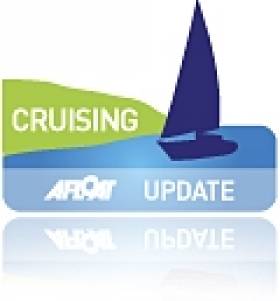Displaying items by tag: builder
Irish Cruising Club Present Fastnet Award to Killian Bushe
So whenever a high-powered strongly-resourced international challenge is taking shape, Bushe is the boat-builder of choice, favoured by leading designers and top skippers alike. But if you have a challenge in mind and he is top of the list, please join the queue.
For at the moment, he is immersed as leading consultant in building the new Groupama 4, the top French Volvo 70 for Franck Cammas. Before that, he built the two successful Ericsson boats for the last Volvo – they took first and fourth. In fact, he has built the overall winners of the last three Volvo races. And when Groupama 4 is launched in May and signed off for the race (which starts on October 29th) Bushe returns his focus to Sweden which is now his home, where he has been involved with the Artemis challenger for the America's Cup 2013.
For that project, the designer is Juan Kouyoumdjian, and the skipper is Paul Cayard. This is stratospheric stuff, but that's the level where Bushe operates. With more than thirty years of high tech boat building experience, and a string of success that is mind-boggling, he is the gold standard. But beyond that, he is still the Crosshaven kid who started his racing on his father George's Avocet (which George designed and built), and internationally he is the spirit of Cork sailing.
His renowned skill and knowledge in the use of advanced materials and composites is such that you'd expect him to be awarded a Honorary Doctorate in chemistry from some appropriate university. But in the meantime, his special place in Irish and world sailing was honoured on Saturday March 26th with his award of the Fastnet Trophy.
This trophy is co-ordinated by the Irish Cruising Club, and it operates in very broad brief. Initiated in 2005 with its first award to Paddy Barry and Jarlath Cunnane for their pioneering circuit of the Arctic via both the Northwest Passage and the Northeast Passage, its unique lineage has been maintained by such awardees as Robin Knox-Johnston, and the most recent one, centenarian circumnavigator Bill King of Galway.
The Fastnet Trophy is envisaged as highlighting a contribution to sailing which has a sense of the unique about it, and Killian Bushe is just the man. His international sailing achievements began back in 1976 when he was one of the crew that won the Half Ton Cup at Trieste in the Cork-built Silver Shamrock. They celebrated by sailing up the Grand Canal in Venice with spinnaker set. But gradually the boat-building took over, though Bushe sails with his family in Sweden whenever he can. That is what was being celebrated on Saturday night. Killian Bushe – very good sailor, extremely good boatbuilder.































































